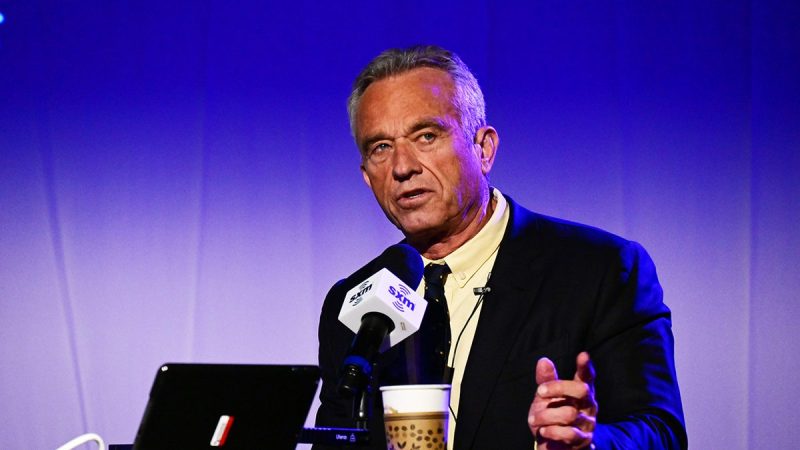
Democrats have pathways to replace Biden in 2024, but they are narrowing
Calls are growing for Democrats to find an alternative to President Biden before the next election. With the first primary contests a few months away, is it too late for them to find a viable replacement?
The short answer is no, but time is running out.
Biden would either need to face a serious primary challenge now or decide to step down later. Either method would make history in the modern era.
Pathway 1: The Democratic primary
Democrats already have a process in place to find a new candidate for the general election. That is the presidential primary. Democrat voters will head to the polls from January to June next year and select a presidential nominee.
Biden already faces competition from Robert F. Kennedy Jr. and Marianne Williamson for that nomination, but polling shows that Democrat voters are not enthusiastic about them.
Instead, a well-known candidate with broad appeal to the Democrat base would need to step up.
The most likely candidate is California Gov. Gavin Newsom, who has toured red states, called for a national referendum on guns, and challenged presidential candidate and Florida Gov. Ron DeSantis to a debate on Fox News.
Biden’s inner circle increasingly sees Newsom as a nuisance, according to reports, though advisers say publicly that they view him as a top surrogate.
Rumors are also swirling around the popular governor of Michigan, Gretchen Whitmer. And Transportation Secretary Pete Buttigieg, who ran for president in 2020 on the need for generational change, has maintained a high profile while serving in the Biden cabinet.
If any of these candidates want to mount a challenge, they have a few weeks left to join the race without compromising their ability to win.
Under the normal rules, many states require candidates to file a declaration by a certain date to appear on their primary ballot. Nevada has the earliest deadline on Oct. 15 – one month from today.
Fourteen more states have filing deadlines before the end of the year.
Each state awards nominating delegates to candidates, so the longer they wait to enter the race, the fewer total possible delegates they can receive.
And Nevada is one of the earliest states on the primary calendar, so it plays an outsized role in setting the direction of the race.
Filling out a declaration takes minutes, but launching a viable presidential campaign takes much more than that. Candidates must court donors, hire staff and develop policies, messaging and a strategy to win.
While that process plays out behind the scenes, media reporting about a new candidate often predates their announcement by weeks or even months. So far, there is no reporting to suggest that any notable candidate is preparing a bid.
In the modern era, an incumbent president has never lost his party’s nomination when running for a second term.
Pathway 2: The Democratic National Convention
Biden’s fate also rests in his own hands.
While he will appear on the primary ballot and is by far the most likely candidate to win the nomination, he can decide to step down from the race at any point.
The ideal time to complete that process would be during the Democratic National Convention in August. Delegates are awarded to candidates during primaries throughout the first half of the year, but they won’t elect a candidate for president until they vote during that convention.
If Biden wins a majority of delegates but wants to step down, he could use a speech prior to the convention or even during the week to endorse another candidate.
Under Democratic Party rules, pledged delegates are not required to vote for the candidate they represent but are told to ‘reflect the sentiments of those who elected them,’ so an endorsement from Biden would be very influential.
If there are multiple candidates, but a majority voted in line with Biden’s wishes, that candidate would become the Democrats’ presidential nominee. This would be a variation on what is usually called a contested convention.
If Biden fails to convince a majority in this hypothetical, and no candidate wins the first ballot at the convention, a brokered convention would take place. Delegates are released from their pledges, so leading figures in the nominating process, like party leaders and congresspeople, would try to persuade delegates to support their preferred candidate instead.
Rounds of voting would take place until one candidate reaches a majority.
Even the cleanest version of this process is messy. Biden would have to decide between endorsing his own vice president, who is officially next in line for his job but unpopular with voters, or a less known and untested alternative.
Meanwhile, a brokered convention would mean chaos. The Democrats would look disunited and directionless during their week in the spotlight, and with less than three months until the general election.
Contested and brokered conventions are rare in the modern era. The last convention that approached ‘contested’ status was the 1980 Democratic race, when Senator Ted Kennedy tried to take the nomination from President Jimmy Carter. Republicans also came close in 1976; that contest was between then Governor Ronald Reagan and President Gerald Ford. Both parties had brokered conventions in 1952.
This all makes a second Biden run the most likely outcome in 2024. If a candidate wants to change that, they would need to act now and accept that they are taking on an unprecedented challenge.
